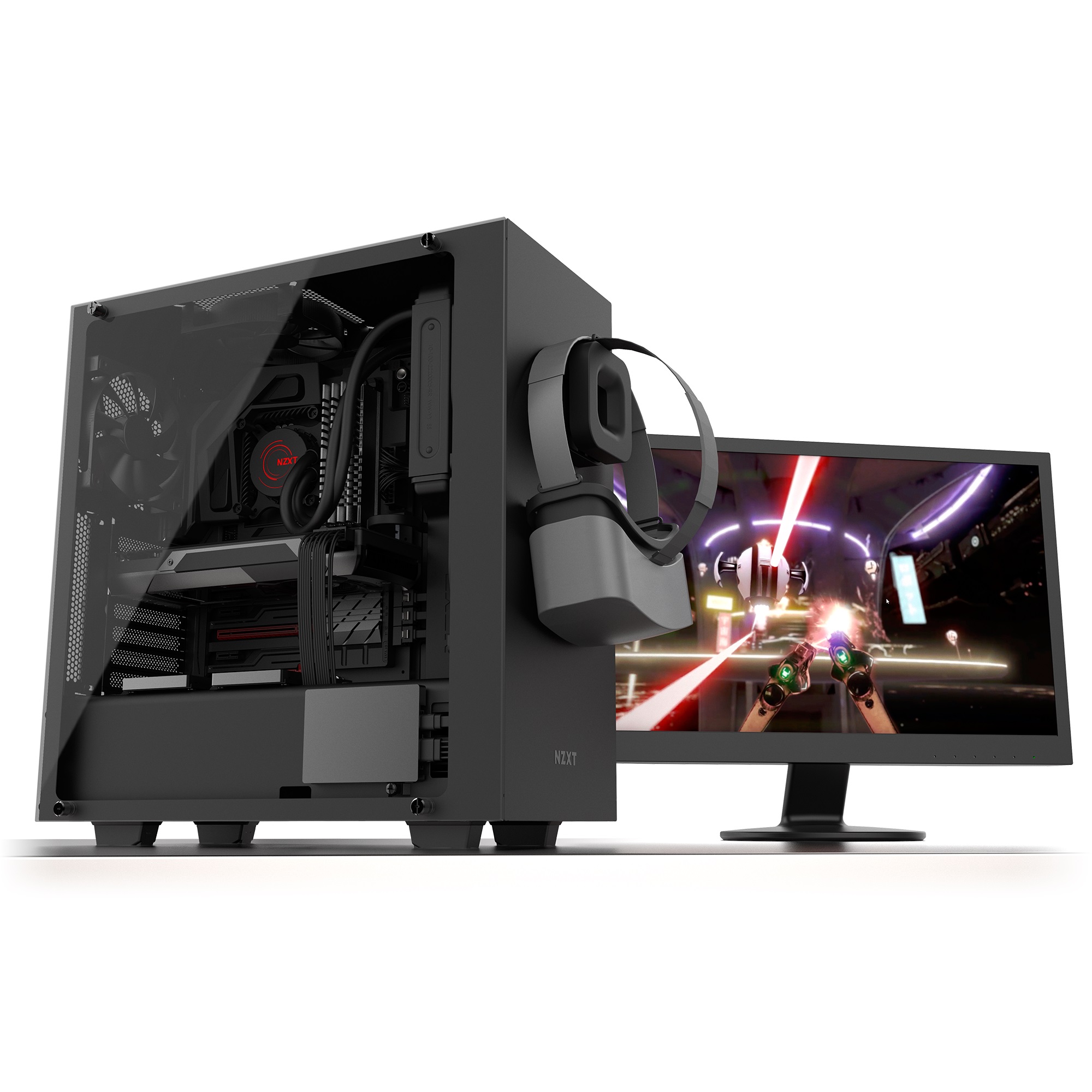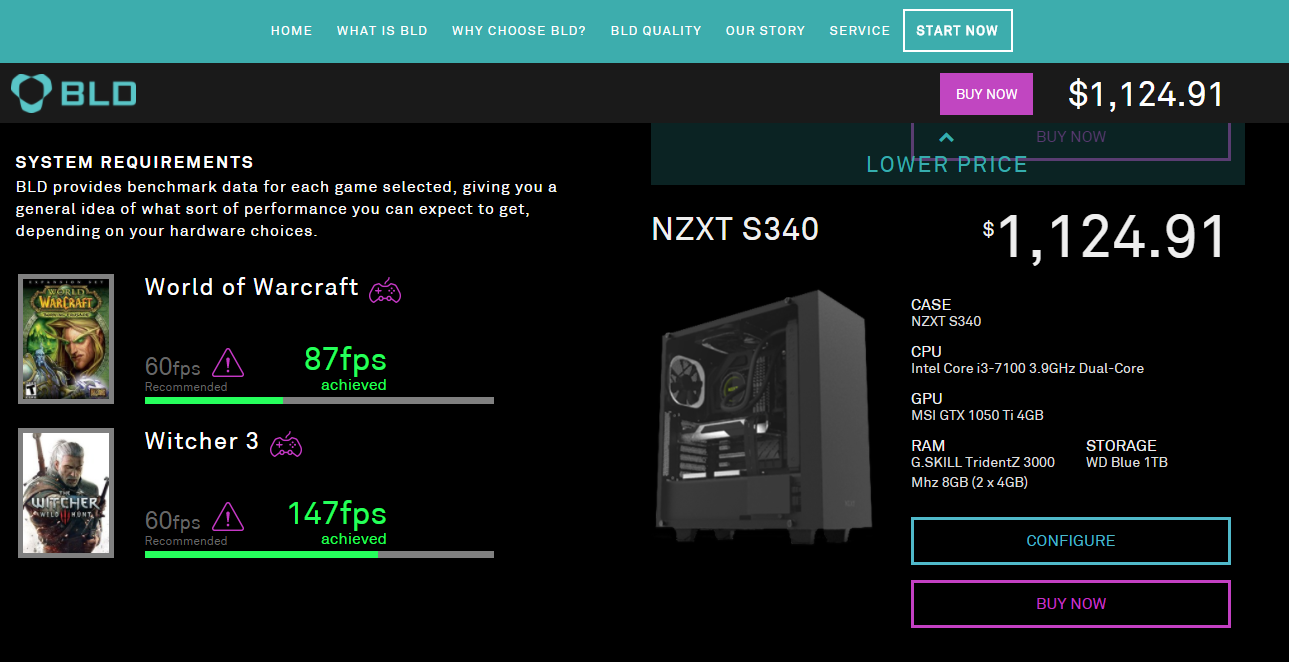NZXT aims to revolutionize how we buy custom-built PCs with BLD
Using performance data collected from thousands of PCs, BLD tailors your custom PC to the games you want to play.

When new employees start at NZXT, they build the PC they're going to use at work. Some get a little help from a build-savvy coworker, but it's a spirit I appreciate: it's obvious, from talking to founder & CEO Johnny Hou, that building your own PC is as big a deal for NZXT as it is for us. But not everyone has the time to research what they should buy and how best to build. For them, NZXT has come up with a new way to order a custom-built PC, called BLD, that puts games first.
Instead of picking a system build based on name, or size, or components you know you want, you pick the games you want to play. BLD, which launches today, is built on top of years of game performance data collected by NZXT's CAM software. The idea is that you pick a popular game, like The Witcher 3 or League of Legends, then pick an approximate price point, and BLD puts together a system for you, with a guarantee that you'll hit a certain framerate within 10 percent.
I told BLD I wanted to play The Witcher 3, and wanted to spend $1500—the minimum price you can choose to shoot for—and it put together a $1200 system that would get well over 60 frames per second at 1080p.
"We've reached that tipping point where we have enough data to confidently say 'these top 10, 20 games, we can predict, and we're going to guarantee,'" says Hou. "So if the games don't perform to expectations, we'll let you return it. Internally, a lot of people were very uncomfortable with that, including the software team, but I was like, 'if we don't do it, no one's going to believe us.' Because we're a hardware company. We can say we've done data analysis and have all this data, but it's hard to believe when you're a hardware company."

After BLD spits out a configuration, you can choose to customize it in two different ways. One is to simply cycle through a number of more and less expensive configurations, which swap out parts like the graphics card and CPU and storage for other options. Go pricier, and you may upgrade from a GTX 1050 Ti to a GTX 1060 to a GTX 1070. There's also the option to dig much deeper and pick components yourself, with short descriptions next to each part (including motherboards, graphics cards, CPUs, the the whole shebang) to help you choose. This also lets you select a different case (from NZXT's library, naturally) and set cosmetic options.
Offering real-world performance data is a great idea, and makes the process of ordering a PC much less abstract for newcomers than picking a prebuilt system by a name or SKU. But I don't think the algorithm and data can replace human advice, at least not yet.
I pointed out to Hou that the recommendation BLD made to me for my $1200 Witcher 3 PC used a dual-core i3 processor. Sure, it'll hit those guaranteed framerates in The Witcher 3, but is it really the best recommendation, when a quad-core i5 could be far more future-proof?
Keep up to date with the most important stories and the best deals, as picked by the PC Gamer team.
I ran into small issues like this testing out the configurator. Some builds only come with a hard drive to save money, and I wouldn't build my worst enemy a PC without an SSD in 2017. Choosing more expensive builds sometimes shows slightly lower FPS ratings, because BLD is swapping out a CPU in one upgrade, then a graphics card in another. Those discrepancies will likely be confusing for new builders.

Looking for more PC building advice? Check out our build guides:
Budget gaming PC
(~$750/£750) - A good entry-level system.
Mid-range gaming PC
(~$1,250/£1,250) - Our recommended build for most gamers.
High-end gaming PC
(~$2,000/£2,000) - Everything a gamer could want.
Extreme gaming PC
(>$3,000/£3,000) - You won the lotto and are going all-in on gaming.
Prefer to buy a prebuilt than building it yourself? Check out our guide to the Best Gaming PCs.
"Because it's a piece of software, we're going to continue to evolve it over time," Hou answered. "I hope by next year the user experience is going to get better, the recommendations will solve some of the concerns you have around recommending an i3—we should probably note to the user, hey, down the road, you might have these issues, consider an i5. The system should be smart enough to tell you that."
And I'm definitely not the target audience for BLD, because I know enough about these components to be able to pick them myself, and I don't want to pay the premium—an estimated $350 for NZXT's labor—to have it built for me. I'll always recommend building your own PC, or having a friend help you do so, unless you're swimming in money. But if your time is scarce and cash isn't, BLD is the most significant launch we've seen in custom PC building in years by at least trying to come at the problem from a different angle.
An intuitive, modern UI alone puts it in a league of its own ahead of the antiquated web stores of most of its competitors. And NZXT plans to ship systems for free within 48 hours, a fast turnaround for a custom-built system.
"I think I would be lying if I said we think we have it perfect today," Hou said. "The truth is, no one's ever built something like this. We don't know what's going to work. I don't even know if this business is going to work, to be honest. What are people going to think, if there's no SKUs to pick from?"
Hou seems eager to evolve BLD as customer feedback and more game data roll in, and the platform is still very much in development, with a mobile site to come after launch. Personally, I hope to see the recommendation algorithm get smarter—but maybe not so smart that it makes us obsolete. You can check BLD out for yourself right here.

Wes has been covering games and hardware for more than 10 years, first at tech sites like The Wirecutter and Tested before joining the PC Gamer team in 2014. Wes plays a little bit of everything, but he'll always jump at the chance to cover emulation and Japanese games.
When he's not obsessively optimizing and re-optimizing a tangle of conveyor belts in Satisfactory (it's really becoming a problem), he's probably playing a 20-year-old Final Fantasy or some opaque ASCII roguelike. With a focus on writing and editing features, he seeks out personal stories and in-depth histories from the corners of PC gaming and its niche communities. 50% pizza by volume (deep dish, to be specific).

